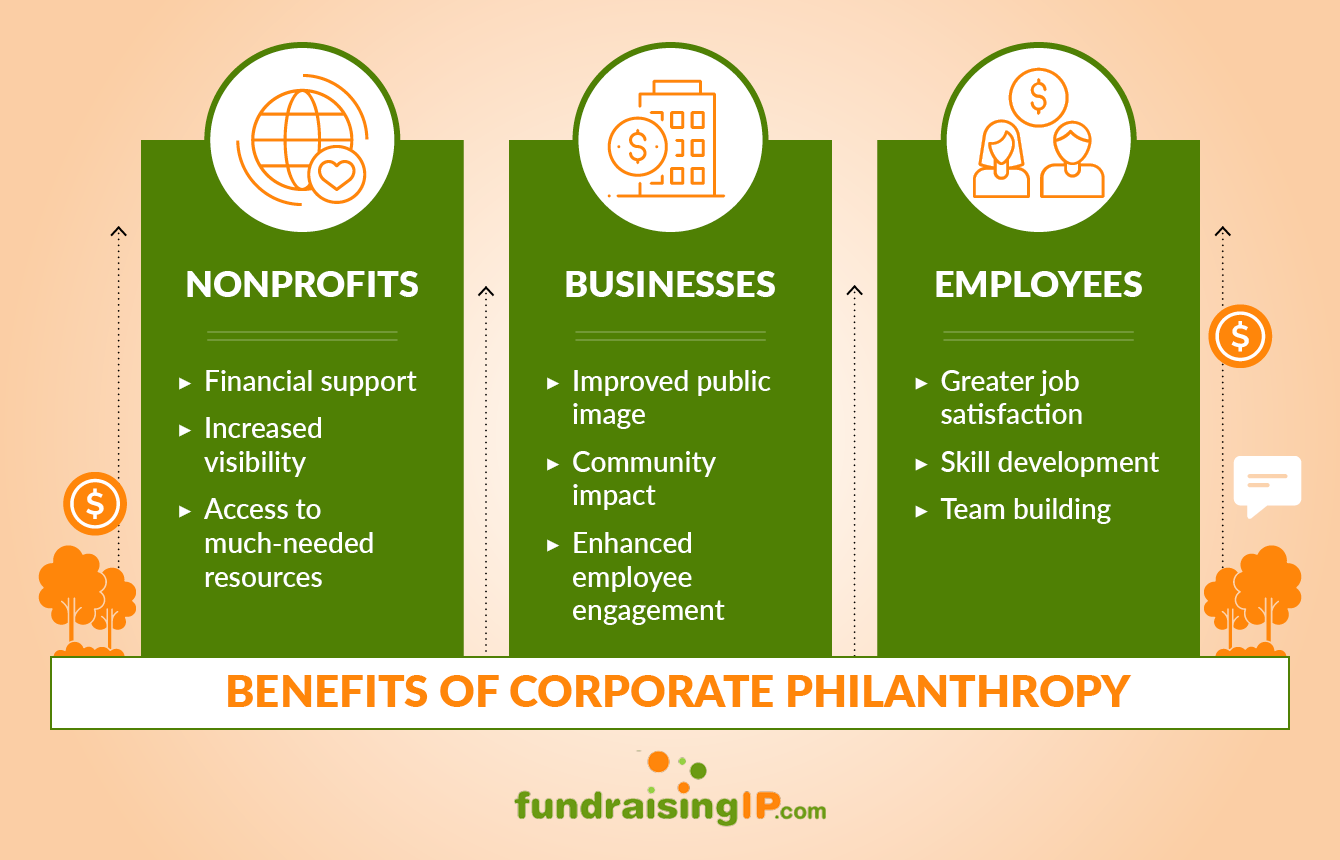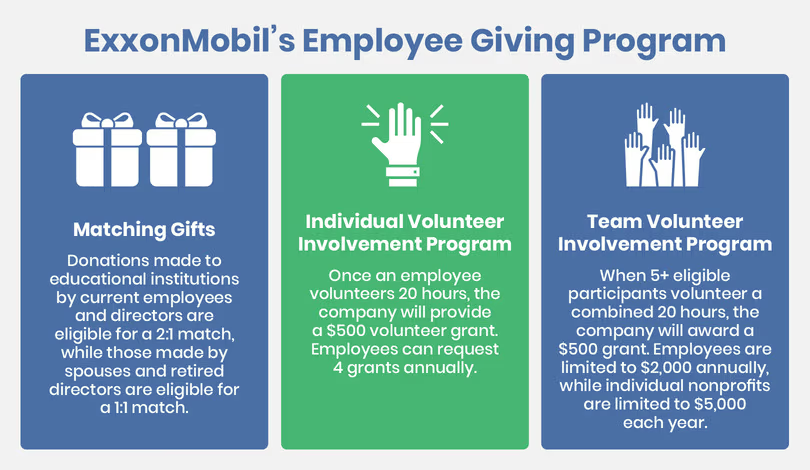Checking Out Exactly How Corporate Philanthropy Shapes Brand Name Track Record and Client Loyalty
Corporate philanthropy significantly affects brand name credibility and consumer commitment. Companies that participate in authentic charitable initiatives frequently see a favorable shift in just how customers regard them. This placement of values cultivates depend on and emotional links with audiences. Nonetheless, the performance of these humanitarian efforts can vary substantially. Comprehending what truly reverberates with customers is necessary for brands looking for to enhance their social effect and market position. What methods will emerge as necessary for future success?
The Evolution of Business Philanthropy
As services increasingly acknowledge their duty in society, the development of company philanthropy has changed from simple philanthropic donations to a calculated part of brand identity. Business involved in philanthropy primarily for tax obligation benefits or to boost their public photo. Gradually, this strategy shifted as stakeholders-- including employees, clients, and capitalists-- demanded a more authentic dedication to social responsibility.
Organizations began aligning their philanthropic initiatives with their core values and business objectives, causing even more impactful and thoughtful payments. This adjustment has actually motivated business to purchase sustainable methods and neighborhood advancement, fostering a sense of purpose that reverberates with customers.
Technical improvements have facilitated transparency and interaction, permitting services to showcase their kind initiatives a lot more successfully. Company philanthropy has actually emerged as an indispensable part of organization method, with organizations welcoming the chance to positively influence society while improving their overall brand name narrative.
The Effect of Philanthropy on Brand Assumption
While business take part in humanitarian initiatives to promote social great, these initiatives considerably shape brand name perception among customers. Corporate philanthropy can improve a brand's image by linking it with positive social effect and community participation. Consumers frequently view brand names that proactively take part in philanthropic activities as even more trustworthy and responsible. This assumption can affect buying choices, as customers might like brands that show a commitment to social issues.

Building Emotional Connections Through Granting
Corporate philanthropy serves as a powerful tool for improving brand identification by connecting business worths with community demands. With tactical giving, firms can foster community involvement and create common worths that reverberate with customers on an emotional level. This method not only enhances brand name reputation however likewise develops long-term links in between services and their stakeholders.
Enhancing Brand Name Identification
When firms take part in philanthropic initiatives, they not only add to societal great yet also create deeper psychological connections with their audiences. By aligning their brand with charitable reasons, firms enhance their identity and signal worths that resonate with customers. This alignment creates a narrative that goes past solutions and products, welcoming consumers to take part in a common goal. As consumers progressively prioritize purpose-driven brands, companies that proactively take part in providing can distinguish themselves in a crowded market. Such initiatives cultivate a sense of loyalty among customers who feel directly connected to the brand's values. Inevitably, corporate philanthropy ends up being a crucial device for enhancing brand identification, growing long-term relationships based on common beliefs and psychological interaction.
Fostering Neighborhood Engagement
Countless research studies indicate that firms engaging in community-focused humanitarian campaigns can considerably strengthen emotional connections with their stakeholders. By buying neighborhood tasks and sustaining social causes, businesses cultivate a sense of belonging and count on within the area. This interaction promotes a positive brand name image, as customers value companies that show real worry for social issues. Furthermore, workers typically feel extra motivated and honored to be associated with an organization that prioritizes area well-being. Therefore, consumers are much more likely to establish commitment in the direction of brand names that proactively add to purposeful causes. Eventually, promoting neighborhood interaction with philanthropy not only improves brand track record however additionally develops enduring psychological ties that benefit both the community and the firm it serves.
Producing Shared Worths
Exactly how can businesses successfully develop common worths that reverberate with their stakeholders? Firms can achieve this by straightening their philanthropic initiatives with their core mission and the passions of their areas. By taking part in efforts that deal with local needs, organizations cultivate psychological links with customers, enhancing brand commitment. Partnering with non-profits that mirror shared values strengthens the brand name's picture and shows dedication to social obligation. Additionally, clear communication concerning these efforts permits stakeholders to see the concrete impact of their payments. Inevitably, by integrating common values right into their business philanthropy, firms not only boost their online reputations however also grow enduring relationships with clients, resulting in boosted loyalty and depend on. This alignment is necessary in modern customer decision-making.
Situation Researches: Successful Philanthropic Campaigns
Checking out successful humanitarian projects reveals numerous methods that enhance brand online reputation. Impactful neighborhood campaigns, innovative partnership designs, and lasting involvement techniques have actually confirmed effective in promoting positive connections with customers. These case research studies highlight the importance of thoughtful business offering in achieving both social and company purposes.
Impactful Area Initiatives
Many business have effectively leveraged kind campaigns to improve their brand name online reputation while making a meaningful impact in their neighborhoods. A technology firm launched a digital literacy program in underserved communities, offering training and resources that equipped regional residents. This initiative not only contributed to neighborhood advancement however likewise positioned the company as a socially responsible leader. Similarly, a significant food firm applied a cravings relief campaign, partnering with local nonprofits to disperse dishes to households in demand. This effort reinforced area ties and fostered customer commitment. With these impactful campaigns, firms have demonstrated their dedication to social obligation, successfully aligning their brand name worths with the needs of the areas they serve, eventually boosting their general credibility.
Innovative Collaboration Models
The success of impactful area efforts typically hinges on innovative collaboration models that combine diverse stakeholders to address facility social challenges. this link Study illustrate how firms, non-profits, and government entities can team up efficiently. A multinational firm partnered with a local charitable to release an education program, merging sources and competence to enhance neighborhood literacy prices. An additional example included a technology firm and a health care company signing up with forces to create a telemedicine option for underserved populaces. These partnerships not only magnified the reach of philanthropic efforts however additionally strengthened the brand names' credibilities by aligning their goals with area needs. Ultimately, ingenious collaboration versions work as a stimulant for meaningful change and foster stronger connections between brands and their consumers.
Long-lasting Involvement Approaches

Determining the ROI of Corporate Social Duty
As business increasingly spend in company social obligation (CSR) initiatives, recognizing the roi (ROI) connected with these initiatives ends up being vital. Measuring ROI in CSR is complex, typically encompassing both qualitative and quantitative metrics. Financial returns can be examined through enhanced sales, enhanced brand name loyalty, and improved worker morale, which can bring about higher efficiency. Additionally, firms may assess expense financial savings linked to lasting methods, such as lowered waste or energy intake.
Qualitatively, the impact of CSR on brand name reputation can be evaluated through consumer understanding researches and social networks view analysis. Studies can provide browse around this site insights right into just how CSR activities influence consumer loyalty and depend on. Benchmarking versus sector standards can assist organizations determine their CSR effectiveness - corporate philanthropy. Eventually, a thorough method to determining ROI makes it possible for companies to make informed decisions regarding future CSR financial investments, aligning methods with both economic efficiency and social impact
Customer Assumptions and Corporate Responsibility
Progressively, consumers expect business to run with a solid feeling of company duty, checking out moral methods as a prerequisite for brand name loyalty. This change in expectation reflects an expanding understanding of ecological and social concerns, leading consumers to favor brands that straighten with their values. Customers are more likely to sustain business that take part in transparent practices, show sustainability, and contribute favorably to their communities.
Furthermore, social media sites amplifies these assumptions, permitting customers to share their viewpoints and experiences quickly. Brands that fail to meet these ethical standards run the risk of backlash, while those that embrace business responsibility commonly delight in improved track record and consumer commitment. As consumers demand responsibility, business must integrate business social obligation into their core techniques, focusing on ethical habits not equally as a marketing approach, yet as a fundamental facet of their procedures. This placement can inevitably cause more powerful brand name fondness and continual success in competitive markets.
Future Trends in Corporate Philanthropy and Brand Loyalty
The landscape of business philanthropy is developing, influenced by the intense consumer assumptions bordering corporate obligation. Companies are progressively incorporating social effect into their core business approaches, not simply as an ancillary task. Future fads show a change toward openness, with brand names sharing click here for info comprehensive details about their kind initiatives and their direct results on neighborhoods.
Furthermore, technology is playing an important function, enabling real-time involvement in between brand names and consumers. Social media site systems help with direct communication, permitting customers to voice their expectations and hold brand names accountable. Furthermore, younger generations, particularly Millennials and Gen Z, focus on sustainability and moral methods, driving services to take on even more diligent approaches.
As company philanthropy comes to be synonymous with brand name identity, companies that authentically straighten their missions with societal needs are likely to cultivate stronger customer commitment. This convergence of values will inevitably form the future of business online reputation and customer partnerships in an increasingly conscientious market.
Regularly Asked Questions
Just How Do Consumers Learn about a Business's Philanthropic Initiatives?
Consumers discover a firm's philanthropic initiatives with various networks, including social networks, news release, area occasions, and word-of-mouth. These methods help with understanding, allowing individuals to engage with brand names that straighten with their worths and passions.
What Duty Does Staff Member Participation Play in Company Philanthropy?
Worker participation in business philanthropy enhances engagement, cultivates a sense of ownership, and reinforces team cohesion - corporate philanthropy. This engagement often amplifies the influence of philanthropic campaigns, resulting in higher awareness and assistance for the company's kind initiatives
Can Corporate Philanthropy Backfire on a Brand name's Credibility?
If perceived as insincere or opportunistic, business philanthropy can without a doubt backfire on a brand name's online reputation. Negative public assumption may arise, causing diminished depend on and commitment amongst consumers that prioritize credibility in company activities.
Are Smaller Companies as Effective in Philanthropy as Larger Firms?
Smaller business can be equally reliable in philanthropy as bigger firms, often showing agility and credibility. Their local efforts might resonate more deeply with neighborhoods, cultivating genuine connections regardless of limited resources compared to their larger counterparts.
Exactly How Can Business Choose the Right Triggers to Assistance?
Companies can choose the right causes by aligning their values with neighborhood requirements, evaluating stakeholder passions, and evaluating prospective influence. This strategic approach cultivates credibility, enhances interaction, and reinforces links with consumers and the more comprehensive area.
While firms engage in kind efforts to advertise social excellent, these efforts significantly form brand perception among consumers. As customers progressively prioritize purpose-driven brand names, business that actively involve in giving can separate themselves in a congested market. Several firms have effectively leveraged kind projects to enhance their brand name credibility while making a meaningful impact in their areas. Progressively, consumers anticipate companies to run with a solid sense of company duty, watching ethical methods as a prerequisite for brand commitment. As business philanthropy comes to be identified with brand identification, firms that authentically straighten their missions with social needs are most likely to foster stronger customer loyalty.